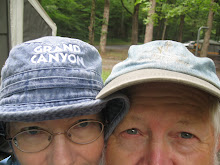Photo Credit: Wikipedia
Here it is in the
last few hours of May, and I only just realized, thanks to the current issue of
StrokeSmart magazine, that May is Stroke Awareness Month. StrokeSmart is from
the National Stroke Association, and as a stroke survivor I find it encouraging
and informative.
The letter from
the magazine’s editor had some statistics that surprised me. To illustrate the
need for heightened awareness of stroke, he compared statistics about another
disease that is much higher than stroke on the radar of most people in the
United States. Think pink for breast cancer awareness. His numbers, all for the
U.S.:
- New diagnoses of
invasive breast cancer number around 230,000 annually, and there are about
40,000 deaths.
- In comparison,
nearly 800,000 strokes occur in the U.S. every year (about one every 40
seconds), and stroke kills nearly 130,000 people every year.
- Stroke is the
fourth leading cause of death in the U.S., behind heart disease, cancers, and
respiratory diseases.
The numbers for both
conditions represent lives of the stricken individuals and their families that are changed forever.
The editor made a
plea for readers to help increase awareness of stroke, from educating others
about the earliest signs of stroke to joining or organizing fundraising events.
An elder and a
stroke survivor, I also found these statistics, reported here, compelling: Nearly three-quarters of all strokes occur in people over the age of 65.
At
any age, recognizing that a stroke may be occurring and getting prompt help is
critical. The FAST way to check for signs of stroke is an easy way to remember the warning signs and how to check for them. Using the FAST memory aid is also a reminder of the need for speed.
In the case of stroke
the reality is that “Time is brain.”
Face—Ask the person
to smile. Does one side of the person’s face droop?
Arms—Ask the person
to raise both arms. Does one arm drift downward?
Speech—Ask the person
to repeat a simple phrase. Is the person’s speech slurred or strange?
Time—If you observe
any of these signs, call 911 immediately.
Photo: Wikipedia


Yes, I have been seeing the ads on T.V. for stroke awareness, one in particular is very effective and rather beautifully done. Scary...and so sorry you have had to go through this. BUT you have come out on the other side!
ReplyDeleteyou would make a great story on one of the ads to show how you can come back if determined and by trying over and over. your story is impressive to me and gives others hope. and this is good for raising awareness so people know what is happening.
ReplyDeleteI had Bell's Palsy twice -- 2004 (a week before daughter's wedding) and 2011. Facial symptoms mimic a stroke, so I had to go to the ER both times to rule out a stroke. Yours was a timely reminder about FACE.
ReplyDeleteThese are very good warnings Linda.
ReplyDeleteI admire you ad the progress you are making. I really appreciate your taking me along in your journey. Wish we were closer to just have a big ole' gab fest. Our hubbies would be rolling their eyes at the way we would be visiting nonstop.
Have a wonderful weekend.
Sue
I had seen those warnings before but really appreciate the reminder. I was no aware how prevalent strokes were.
ReplyDeleteI totally agree with Sandra.
Periodic reminders are good for us. I know FAST, but forget, just as I do for the other beneficial acronyms out there. Thanks for that crucial reminder. And yes, Sandra is right. :)
ReplyDeleteTimely information. I hadn't heard of the magazine. I will check it out. Thanks for the tip.
ReplyDeleteDianne
Just stopping by to catch up with you since I've been off-line for a few days. I hope you are well.
ReplyDeleteI've had several family members who've suffered strokes,(grandmother, mother, MIL, FIL) so it's always in the back of my mind. There's some family history of breast cancer, too, but strokes seem to be more prevalent in our families.
I take blood thinner as a cautionary. My AFib problem had stroke as the number one danger. Fortunately an ablation procedure at Mayo Rochester finally provided a fix...:)
ReplyDeleteGreat info. Why not send it to Ronnni Bennetts blog for seniors. :)
ReplyDelete